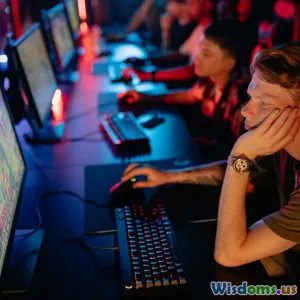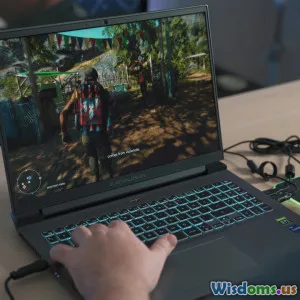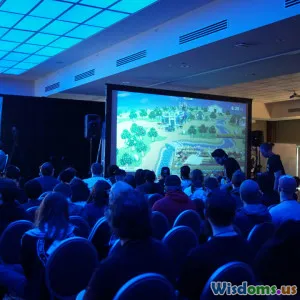
How to Start Your Own Friendly Esports Tournament
8 min read Discover step-by-step guidance to launch your own friendly esports tournament and unite gamers for fun and competition. (0 Reviews)
How to Start Your Own Friendly Esports Tournament
Esports has exploded from niche communities into mainstream entertainment, attracting millions worldwide to watch, play, and compete. Whether you're passionate about gaming or looking to build a social community, organizing a friendly local or online esports tournament is an exciting way to engage players and spectators alike. But where do you begin? How do you create an inviting yet competitive environment without overwhelming yourself?
This guide breaks down exactly how to start your own friendly esports tournament, step by step. From conceptualizing the event to managing logistics and marketing, you’ll gain a thorough understanding that will help bring your vision to life.
Why Host a Friendly Esports Tournament?
Before jumping into logistics, consider why you want to host a tournament. Friendly esports competitions serve multiple purposes:
- Community Building: They unite gamers of all skill levels, fostering camaraderie rather than ruthless competition.
- Skill Development: Participants improve their gaming abilities in a supportive setting.
- Exposure for Local Talent: Provides a platform where local players can shine and connect.
- Entertainment: An exciting event to watch and participate in, elevating the local gaming culture.
Many successful esports organizations began simply as grassroots efforts. For example, Riot Games’ own early League of Legends tournaments started small, focused on fostering community before exploding globally.
Understanding your "why" shapes the tone and format of your tournament.
Planning Your Tournament: The Foundation
Define Your Goals and Scale
Are you aiming for a casual evening event with friends, a weekend-long open community tournament, or a recurring monthly competition? Setting clear, realistic goals impacts everything:
- Participant Count: Expect 8-16 players for a friendly in-person event; hundreds if online.
- Budget: Consider prize pools, stream quality, equipment rental, and venue costs.
- Format: Single elimination for quick play or double elimination for fairness.
Example: A local café hosted a 16-player Rocket League tournament with $200 prize money, feeding into a recurring monthly series that built local excitement.
Choosing the Right Game(s)
Pick games that cater to your target audience and their devices. Popular friendly tournament games include:
- Fighting Games: Street Fighter V, Super Smash Bros. Ultimate
- MOBA Games: League of Legends, Dota 2
- FPS Titles: Overwatch, Valorant
- Casual Multiplayer: Among Us, Mario Kart
Consider licensing restrictions, whether the game supports offline tournaments, and community enthusiasm.
Selecting a Format and Ruleset
Your tournament’s style influences player engagement and scheduling:
- Bracket Type: Single elimination, double elimination, round robin
- Team Size: Solo, duos, or squads
- Match Format: Best-of-one, best-of-three, best-of-five
- Fair Play Rules: Code of conduct, cheating penalties
For friendly vibes, simpler and forgiving formats help keep participants happy.
Organizing Logistics
Venue and Equipment
For physical events:
- Secure a space with adequate internet bandwidth and power outlets.
- Ensure enough PCs or consoles, controllers, and comfortable seating.
- Plan for backup equipment.
For online tournaments:
- Use reliable platforms like Battlefy, Challonge, or Smash.gg for bracket management.
- Decide on streaming services such as Twitch or YouTube if you want to broadcast.
Scheduling and Duration
Select date and time zones thoughtfully, especially for online players from various regions.
Example: Weekend afternoons often work well, avoiding work and school conflicts.
Avoid lengthy schedules to prevent fatigue; a 4-6 hour window is ideal for most friendlies.
Registration Process
Easy access and clarity are pivotal:
- Use Google Forms or dedicated esports registration platforms.
- Collect contact info, preferred platforms, and gamer tags.
- Clearly communicate deadlines and expectations.
Staffing and Volunteer Management
Even friendly events require coordinators to:
- Manage match flow
- Handle disputes
- Stream and commentate if applicable
Engage volunteers from your community or gaming clubs to share responsibilities.
Marketing and Community Engagement
Creating Buzz
Tap into social media groups, Discord servers, and flyers at gaming hubs:
- Create a dedicated event page on Facebook or Meetup.
- Engage with local gaming cafés or comic shops for cross-promotion.
Quote from Esports organizer Alice Wong: "Our grassroots tournaments thrived once we involved local community leaders. It made the event feel less 'corporate' and more like a neighborhood hangout."
Incentives and Prizes
While grand cash prizes aren’t necessary, rewards motivate participation:
- Give out game merch, gift cards, or trophies.
- Recognition through shout-outs or social media features.
These foster a welcoming atmosphere while adding excitement.
Streaming and Broadcasting
Even beginner streamers can set up Twitch streams with in-game overlays to showcase matches and commentary.
This increases reach and lets absent community members enjoy the action remotely.
Running the Event
Before the Event
- Send reminders with schedule and rules.
- Test equipment and internet connectivity.
During the Event
- Keep matches on schedule and update brackets visibly.
- Encourage sportsmanship and fun.
- Use chat channels for quick communication.
After the Event
- Announce winners and share highlights.
- Collect feedback via surveys.
- Plan follow-up events based on participant interest.
Challenges and How to Overcome Them
- Technical Glitches: Always have backup equipment; test your network rigorously.
- Player No-Shows: Overbook by a few and have clear policies.
- Disputes: Establish clear rules and assign referees.
Conclusion
Launching your own friendly esports tournament is a rewarding way to build community, enhance gaming skills, and create lasting memories. Though it demands organization and patience, the satisfaction of witnessing players bond through competition is immeasurable. Whether aiming for a small local meet or an online bonanza, meticulous planning and community engagement lay the foundation for success. Start small, learn from each event, and watch your esports community flourish!
Further Resources
- Battlefy – Tournament management platform
- Smash.gg – Esports event creation and bracket tools
- Discord – Community building and communication
Embrace the challenge and game on!
Rate the Post
User Reviews
Popular Posts


















